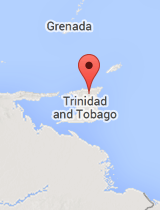Medical Summary
The health risk information presented here is summarized from Shoreland Travax®, a decision-support tool used by health care providers to perform a detailed health risk analysis based on specific locations, individual travel styles, and traveler risk behaviors. Travax provides practitioners current, independently researched malaria risk and prevention recommendations in a map-based format that goes beyond the annual WHO and US CDC statements included here. Not included here are current reports from Travax of disease outbreaks or environmental events that may pose elevated risks to travelers’ health and safety. The Providers section of this site offers a directory of health care providers who utilize Shoreland Travax for travel health counseling. Learn more about the detailed reports and maps available from these practitioners (includes links to samples).
General Information
Trinidad and Tobago is a developing nation classified as high income. Located between the Caribbean Sea and the Atlantic Ocean (north of Venezuela), the climate is classified as humid equatorial (short dry season).
Vaccinations
Yellow Fever
See also: Library article for Yellow Fever
Vaccination is usually recommended if you’ll be traveling in areas where there is risk of yellow fever transmission.
- Requirement: No requirement for any traveler as of November 18, 2022 per the 2022 online update of International Travel and Health.
- Official Status: listed by WHO as a country where YF transmission risk is present.
Other Vaccines
Depending on your itinerary, your personal risk factors, and the length of your visit, your health care provider may offer you vaccination against COVID-19, hepatitis A, hepatitis B, influenza, measles, mumps, rubella, rabies, or typhoid fever. Routine immunizations, such as those that prevent tetanus/diphtheria or "childhood" diseases, should be reviewed and updated as needed.
Malaria
See also: Library article for Malaria
The following is current information as reported by the World Health Organization (WHO) and the US Centers for Disease Control (CDC):
WHO—International Travel and Health (current online update, Country List)
No statement given.CDC—Health Information for International Travel (current online edition)
Areas with malaria: None.
Drug resistance: Not applicable.
Other Concerns
Travelers' Diarrhea
See also: Library article for Travelers' Diarrhea
High risk exists throughout the country, with moderate risk in deluxe accommodations. Community sanitation and food safety measures are generally inadequate. Some itineraries (e.g., remote destinations, austere accommodations) and activities (e.g., ecotourism, eating street or local-market food) further increase risk.
Travelers should observe food and beverage precautions, which reduce the likelihood of illness.
Travelers should carry loperamide for self-treatment of diarrhea and, if risk is moderate to high, an antibiotic to add if diarrhea is severe. Consult a knowledgeable health care provider regarding which antibiotic is appropriate for you and most effective for your destination.
Other Food-Borne Illnesses
Precautions to prevent seafood poisoning may be needed.
Insect- and Arthropod-Borne Diseases
Chikungunya, dengue, mayaro virus, West Nile virus, Zika may pose a risk. Personal protective measures are important.
Other Disease and Health Risks
Additional concerns include helminths, leptospirosis, marine hazards, melioidosis, sexually transmitted infections, snakebites.
Consular Advice
The material below includes information from the US Department of State (DOS), the UK Foreign, Commonwealth & Development Office (FCO), Global Affairs Canada (GAC), and Australia's Department of Foreign Affairs and Trade (DFAT), as well as from additional open-source material. Standard safety precautions that apply to all international travel can be found in the Library article Safety and Security.
Consular Travel Advice
Due to crime, US (DOS) advises reconsidering travel (or avoiding nonessential travel) to this country. UK (FCO), Canada (GAC), and Australia (DFAT) have no current warnings.
Terrorism Risk
Risk of attack by transnational terrorist groups exists throughout the country. Targets may include domestic and international organizations and businesses; public places and events, including those frequented by tourists; and transportation systems.
Crime
High risk of violent crime (armed robbery, home invasion, sexual assault, and murder) exists throughout the country. Trinidad Island: especially in Port of Spain (Queens Park Savannah; eastern neighborhoods of Laventille, Morvant, and Barataria; scenic rest stops after dark; and in and around cruise ship docks and Fort George); on Maracas and Las Cuevas beaches; in La Brea Pitch Lake. Tobago Island: especially in Bacolet area of Scarborough; in Mount Irvine/Buccoo Bay; at waterfalls; on isolated beaches.
Kidnappings by criminal groups may occur throughout the country, including Port of Spain.
Civil Unrest
Protests and demonstrations may infrequently occur and have the potential to turn violent without warning. Bystanders are at risk of harm from violence or from the response by authorities. Disruption to transportation, free movement, or the ability to carry out daily activities may occur.
Water Safety
Rent water sports equipment from reputable operators. Scuba dive only with personnel certified by PADI or NAUI, and use equipment only from PADI- or NAUI-certified dive operators.
Transportation Safety
High risk of traffic-related injury or death exists. The road traffic death rate is 12 to 24 per 100,000 population. The rate is less than 10 in most high-income countries.
Speed laws are poorly enforced.
Structural standards for vehicles may not meet international standards.
Airline Safety
The US Federal Aviation Administration has determined that the civil aviation authority of this country oversees its air carriers in accordance with minimum international safety standards.
Natural Disasters
The hurricane season is from June through November. Floods, mudslides, and landslides may occur.
Seismic activity frequently occurs.
Consular Information
Selected Embassies or Consulates in Trinidad and Tobago
- United States: [+1-868] 622-6371; tt.usembassy.gov
- Canada: [+1-868] 622-6232; www.trinidadandtobago.gc.ca
- United Kingdom: [+1-868] 350-0444; www.gov.uk/world/organisations/british-high-commission-trinidad-and-tobago
- Australia: [+1-868] 822-5450; trinidadandtobago.embassy.gov.au
Trinidad and Tobago's Embassies or Consulates in Selected Countries
- In the U.S.: foreign.gov.tt/missions-consuls/tt-missions-abroad/diplomatic-missions/embassy-washington-dc-us
- In Canada: foreign.gov.tt/missions-consuls/tt-missions-abroad/diplomatic-missions/consulate-general-toronto-canada
- In the U.K.: foreign.gov.tt/missions-consuls/tt-missions-abroad/diplomatic-missions/high-commission-london-united-kingdom
- In Australia: Trinidad and Tobago does not have an embassy or consulate in Australia.
Visa/HIV Testing
HIV testing is not required to obtain a tourist, work, or residence visa.

